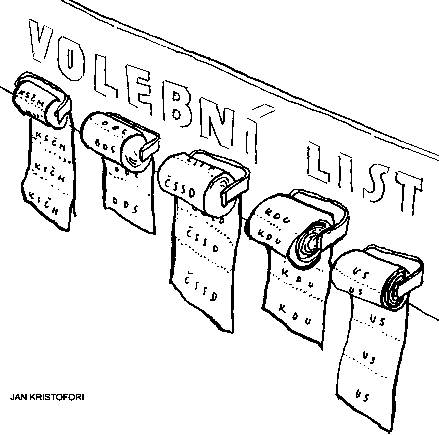¨¨
The people of the Czech Republic will be voting – or not voting, as the case may be – in general elections tomorrow and after-tomorrow. Prague Daily Monitor has been publishing an election blog, which is written by political scientist and journalist Petr Kutílek.
For those of you who are interested in Czech politics and/or parliamentary systems, I have stolen Petr’s first blog entry, which is a brief and clear explanation of how things work – or don’t work, as the case may be – here in the Czech lands.
The Chamber of Deputies, and why this is the most important election in Czech politics
(22 May 2006)
For those of you who are interested in Czech politics and/or parliamentary systems, I have stolen Petr’s first blog entry, which is a brief and clear explanation of how things work – or don’t work, as the case may be – here in the Czech lands.
The Chamber of Deputies, and why this is the most important election in Czech politics
(22 May 2006)
The 200-member strong lower house of the Parliament is the true centre of legislative power in the Czech Republic, much stronger than the Senate, and effectively also defines the executive power. As the Czech Republic has a parliamentary system, the executive (the government/administration) is generated based on the strength of the parties in the Parliament, specifically the Chamber. After a Chamber election, the government must resign. The President usually designates the leader of the strongest party to become the next Prime Minister. Once he (you guessed it, there hasn't been a she so far, nor will there be after this election) has managed to build a coalition and has presented the cabinet's program for the term, the cabinet has to be approved by the Chamber.
Otherwise, the importance of the Chamber lies in the fact that it can overturn the vetoes of both the Senate and the President on most bills, that it exclusively decides on the state budget, and that it can question and vote on non-confidence in the government. This election is also important for another reason: In less than three years, the new President will be elected, and most likely the Constitution will not have been amended to enact direct popular election of the President. (Although most parties now claim to support the popular shift in the run-up to the election.) Under the current constitution, the President is elected by the Parliament, and the Chamber effectively prevails when separate voting in both houses fails to produce a clear winner.
The Chamber of Deputies is elected through a proportional representation system, whereby citizens vote for a party rather than a single candidate. (A two-round majority system, where voters choose an individual senator to represent their district is used for the upper house.) Within the party's list of candidates (each party has a list for each of the fourteen regions), voters can further give preferential votes to two candidates of their liking. There is a 5% cutoff threshold that a party has to cross nationwide. The 200 seats in the Chamber are proportionally distributed only among the parties that have crossed that threshold.
¨¨
It matters not who casts the votes, but who counts them.
– attributed to Josef Stalin



No comments:
Post a Comment